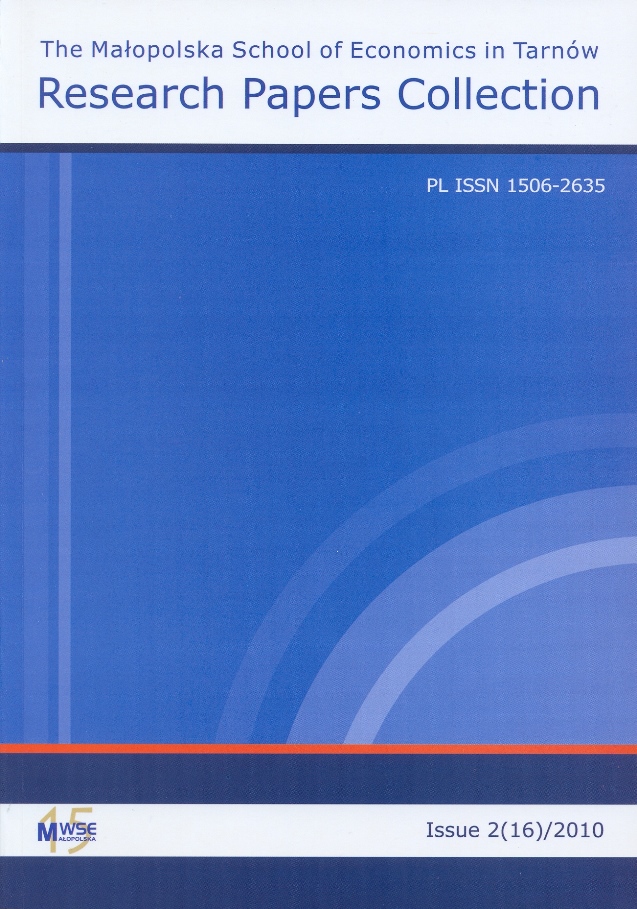Abstract
Each participant in an organisation has a certain potential for development: skills, preferences and interests conducive to specific groups of occupations, types of activities or types of careers. Sufficiently early and accurate diagnosis of this potential is not only an important personal question, but first and foremost an issue of major importance for the society and organisation, including also economic aspects. Indeed, classics of economics have pointed out that the wealth of nations comes not only from the general principles of market management but also from that of how they are used for individual abilities, talents and motivation of creative activities. One of the main objectives of the education system at any level should be an early identification of skills and talents and training them for effective and creative activities. Age of workers should not be here a general factor, because the intellectual development of human resources is important at every stage of their career.
References
Bajcar B. et al. 2006. “Psychologia preferencji i zainteresowań zawodowych: Przegląd teorii i metod”. Zeszyty Informacyjno-Metodyczne Doradcy Zawodowego, no. 34.
View in Google Scholar
Bańka A. 1995. Zawodoznawstwo, doradztwo zawodowe, pośrednictwo pracy: Psychologiczne metody i strategie pomocy bezrobotnym. Poznań: Wydawnictwo PRINT-B. ISBN 83-900566-1-5.
View in Google Scholar
Davenport Th., Prusak L. 1998. Working knowledge: How organizations manage what they know. Harvard: Harvard Business School Press. ISBN 1-57851-301-4.
View in Google Scholar
Edvinsson L., Malone M. S. 2001. Kapitał intelektualny. Transl. by M. Marcinkowska. Warszawa: Wydawnictwo Naukowe PWN. ISBN 83-01-13509-3.
View in Google Scholar
Gottfredson L. S. 1986. “Circumscription and compromise: A developmental theory of occupational aspirations”. Journal of Counseling Psychology, vol. 28 (6).
View in Google Scholar
Gottfredson L. S. 1996. “Gottfredson’s theory of circumscription and compromise”. In: Career choice and development. Ed. D. Brown, L. Brooks. San Francisco: Jossey-Bass. ISBN 0787902047.
View in Google Scholar
Gruszecki T. 2002. Współczesne teorie przedsiębiorstwa. Warszawa: Wydawnictwo Naukowe PWN. ISBN 83-01-13612-X.
View in Google Scholar
Holland J.L. 1985. Professional manual for Vocational Preference Inventory. Odessa FL. Psychological Assessment Resources.
View in Google Scholar
Holland J.L. 1992. Making vocational choices: A theory of vocational personalities and work environments. Odessa FL. Psychological Assessment Resources.
View in Google Scholar
Kornacka D., Marek S. 2001. “Zasoby i ich rola w przedsiębiorstwie”. In: Elementy nauki o przedsiębiorstwie. Ed. S. Marek. Szczecin: Fundacja na rzecz Uniwersytetu Szczecińskiego. ISBN 83-914788-4-X.
View in Google Scholar
Mrozowicz K. 2007. “Zachowania przedsiębiorcze młodzieży licealnej w kontekście zarządzania wiedzą”. In: Wymiary aktywności samorządów lokalnych w obszarze współpracy transgranicznej. Ed. M. Karapyta. Jarosław: Instytut Ukraińsko-Polski PWSZ w Jarosławiu. ISBN 978-83-88139-64-2.
View in Google Scholar
Mrozowicz K. 2008. “Osobowościowa geneza i determinacja kształtowania się zachowań przedsiębiorczych”. In: Wpływ zarządzania procesowego na jakość i innowacyjność przedsiębiorstwa. Ed. E. Skrzypek. Vol. 2. Lublin: Uniwersytet Marii Curie-Skłodowskiej. Wydział Ekonomiczny. Zakład Ekonomiki Jakości i Zarządzania Wiedzą. ISBN 978-83-924547-3-1.
View in Google Scholar
Murray P., Myers A. 1997. “The facts about knowledge: Special report”. Information Strategy, no. 11, p. 35.
View in Google Scholar
Nonaka I., Takeuchi H. 2000. Kreowanie wiedzy w organizacji. Warszawa: Polska Fundacja Promocji Kadr. ISBN 83-86890-99-1.
View in Google Scholar
Nosal C. 1990. Psychologiczne modele umysłu. Warszawa: Państwowe Wydawnictwo Naukowe. ISBN 83-01-09293-9.
View in Google Scholar
Nosal C., Piskorz Z., Świątnicki K. 1998. Kwestionariusz Preferencji Zawodowych KPZ. Polska adaptacja skali Johna L. Hollanda: Podręcznik dla doradców zawodowych. Warszawa: Ministerstwo Pracy i Polityki Socjalnej.
View in Google Scholar
Plomin R. et al. 2001. Genetyka zachowania. Warszawa: Wydawnictwo Naukowe PWN. ISBN 83-01-13568-9.
View in Google Scholar
Probst G., Raub S., Romhardt K. 2004. Zarządzanie wiedzą w organizacji. Kraków: Wydawnictwo Naukowe PWN. ISBN 83-88597-77-9.
View in Google Scholar
Strojny M. 1999. “Zarządzanie wiedzą i kapitałem intelektualnym jako nowe źródło przewagi konkurencyjnej”. Problemy Jakości, no. 12, p. 12.
View in Google Scholar
© Copyright by Małopolska School of Economics in Tarnów. The articles are available under the Creative Commons Attribution NonCommercial-NoDerivatives 4.0 International License


